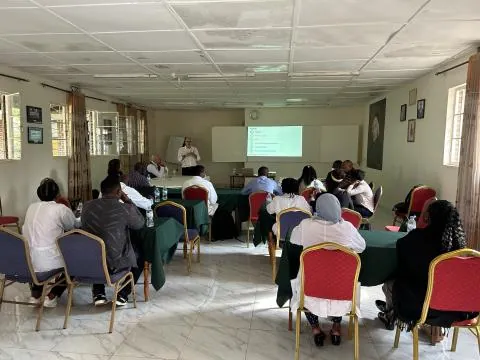
Unraveling the Mysteries of Asthma-COPD Overlap Syndrome: Key Insights from CHEST 2024
2024-10-09
Author: Rajesh
Introduction
Asthma-COPD overlap syndrome (ACOS) is increasingly recognized as a complex respiratory condition that presents a significant challenge for effective diagnosis and treatment. Characterized by overlapping symptoms from both asthma and chronic obstructive pulmonary disease (COPD), ACOS often goes underdiagnosed, complicating management strategies for affected patients. The recent CHEST 2024 conference, which took place from October 6 to 9 in Boston, Massachusetts, provided critical insights into the difficulties surrounding ACOS and emphasized the need for targeted research and better treatment options.
Need for Accurate Diagnosis
Accurate diagnosis of ACOS is essential to optimize patient care. During the conference, two significant poster presentations detailed the diagnostic challenges and proposed treatment avenues for ACOS. A case report highlighted the importance of recognizing the nuances of each patient's respiratory condition to tailor effective treatment plans. The complexity of ACOS stems from its varied presentation, with many patients suffering from acute wheezing, persistent cough, and excessive sputum production, symptoms which complicate clear differentiation from straightforward COPD or asthma.
Illustrative Case Study
An illustrative case study presented involved a 60-year-old female patient with a history of COPD and significant risk factors, including a long history of smoking. Post-diagnosis, she experienced serious limitations in her functional status, prompting healthcare providers to implement a treatment regimen consisting of fluticasone propionate, salmeterol, and tiotropium. Remarkably, within a month of this therapy, she reported considerable symptom relief, indicating a possible asthma component alongside COPD characteristics. This case reflects the urgent need for healthcare professionals to adopt a nuanced approach when diagnosing ACOS, as a mere oversight could lead to inadequate care and suboptimal health outcomes.
The Challenge of Misdiagnosis
Moreover, the challenge of misdiagnosis looms large in ACOS. Another poster at CHEST 2024 discussed how misdiagnosing ACOS as COPD has serious implications for patient care. In a retrospective study involving 284 veterans previously diagnosed with COPD, investigators found that 17 patients met the criteria for ACOS despite having been misclassified. Notably, among these, seven exhibited elevated eosinophil counts—indicative of a potentially beneficial response to inhaled corticosteroid therapy.
Current Treatment Paradigms
Current treatment paradigms emphasize a dual approach combining inhaled corticosteroids with long-acting bronchodilators, specifically for patients showing asthma-like symptoms in the context of ACOS. This has gained further endorsement from the Global Initiative for Chronic Obstructive Lung Disease, which warns against exclusive reliance on long-acting beta agonists (LABAs) due to associated respiratory risks.
Conclusion
The CHEST 2024 findings accentuate an essential truth: early recognition and appropriate therapy for ACOS can significantly influence patient outcomes. The studies presented indicate that understanding the distinct features of ACOS and the underlying pathophysiology can lead to more successful management strategies.
As the medical community continues to advance research on ACOS, it's increasingly clear that both physicians and patients stand to benefit from improved diagnostic frameworks and a clearer understanding of treatment efficacy. With such developments, there is hope that we can navigate the complexities of respiratory conditions more effectively, ultimately enhancing the quality of care for those affected by asthma-COPD overlap syndrome.
This conference has made it evident that while the road ahead may be fraught with challenges, innovation in research is paving the way for better patient management and improved health outcomes. Stay tuned for more essential insights from CHEST 2024 that could change the landscape of respiratory care forever!





 Brasil (PT)
Brasil (PT)
 Canada (EN)
Canada (EN)
 Chile (ES)
Chile (ES)
 España (ES)
España (ES)
 France (FR)
France (FR)
 Hong Kong (EN)
Hong Kong (EN)
 Italia (IT)
Italia (IT)
 日本 (JA)
日本 (JA)
 Magyarország (HU)
Magyarország (HU)
 Norge (NO)
Norge (NO)
 Polska (PL)
Polska (PL)
 Schweiz (DE)
Schweiz (DE)
 Singapore (EN)
Singapore (EN)
 Sverige (SV)
Sverige (SV)
 Suomi (FI)
Suomi (FI)
 Türkiye (TR)
Türkiye (TR)